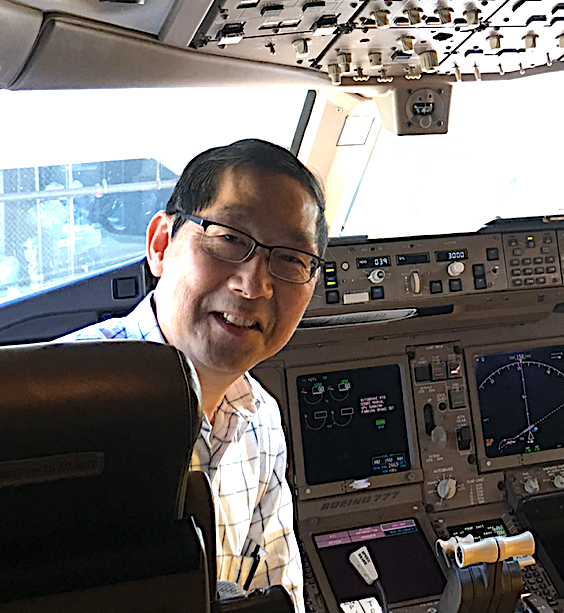
Yip-Wah Chung
Professor of Materials Science and Engineering and (by courtesy) Mechanical Engineering
Email: ywchung@northwestern.edu
My research interests are in (i) the design, synthesis, and characterization of protective coatings, (ii) the role of surface chemistry in friction, wear, and lubrication, and (iii) computational design and development of high-performance alloys for civil infrastructure, power plant, and transportation applications. Some examples are described below:
Making hard and tough coatings
Usually, there is an inverse relationship between hardness and toughness of materials: the harder the material, the lower the toughness. We showed that such a trend can be reversed using a two-component multilayer coating, in which nanometer-thick metal layers with large elastic modulus are separated by ultrathin ceramic spacers. Such coatings have hardness comparable to typical ceramic materials and toughness typical of metals.
References: Shi et al., “Reversing the inverse hardness-toughness trend using W/VC multilayer coatings”, Surface and Coatings Technology 284, 80-84 (2015); Chen et al., “Commentary on the using H/E and H3/E2 as a proxy for fracture toughness of hard coatings”, Thin Solid Films 688, 137265 (2019).
Reducing friction and wear via smart oil additives
Common additives in engine oils designed to improve friction and wear contain phosphorus and sulfur, which can adversely affect the functionalities of catalytic converters. We have been experimenting with oil-soluble additives containing two distinct functional groups: one or more surface-active groups (e.g., carboxylic groups) and one containing metastable cycloalkanes (e.g., cyclopropane). We demonstrated that such additives can reduce wear by a factor of ten under boundary lubrication conditions. This reduction is accompanied by the formation of oligomers, sometimes called friction polymers. Molecular dynamics simulation studies demonstrate that friction polymer formation is initiated by the fragmentation of the initial additive molecules.
References: Johnson et al., “Direct formation of lubricous and wear-protective carbon films from phosphorus- and sulfur-free oil-soluble additives”, Tribology Letters 66:2 (2018); Wu et al., “Formation and nature of carbon-containing tribofilms”, ACS Applied Materials and Interfaces 11, 16139-16146 (2019).
Designer steels for more efficient power plants
About 80% of the world’s electricity is produced by steam turbines. One can raise the efficiency of power plants by increasing the operating temperature of steam generators. The “gold” standard material used in steam generators is grade 91 steel, which was developed in the 1980’s and was designed to operate up to 600 °C. We have embarked on a program to design new steels based on computational thermodynamics. These steels are strengthened by thermodynamically stable, nanoscale metal-carbonitride precipitates. Our initial research resulted in the successful development of two steels: one suitable as a fire-resistant steel for buildings and one for steam generators in power plants operating at 700 °C.
References: Gross et al., “Design and development of lightly alloyed ferritic fire-resistant structural steels”, Metallurgical and Materials Transactions A50, 209-219 (2019); Du et al., “Design and characterization of a heat-resistant ferritic steel strengthened by MX precipitates”, Metall. Materials Trans. 51A, 638-647 (2020).
Awards and Honors
Visiting Scientist, Austrian Center of Competence in Tribology (2012)
Fellow, Society of Tribologists and Lubrication Engineers (2005)
Innovative Research Award, ASME Tribology Division (2002)
Fellow, American Vacuum Society (2000)
National Storage Industry Consortium Technical Achievement Award (1999)
Fellow, ASM International (1998)
Visiting Fellow, Japan Society for Promotion of Science (1997)
Ralph A. Teetor Engineering Educator Award, SAE (1991)
ASME Tribology Division Best Paper Award (1990)
Teacher of the Year in MSE (1986,1991)
Recent Publications
-
Yao Du, Xiaolin Li, Xu Zhang, Yip-Wah Chung, Dieter Isheim, and Semyon Vaynman, “Design and characterization of a heat-resistant ferritic steel strengthened by MX precipitates”, Metall. Materials Trans. 51A, 638-647 (2020)
-
Arman Khan, Hongxing Wu, Qiang Ma, Yip-Wah Chung, Q. Jane Wang, "Relating tribological performance and tribofilm formation to the adsorption strength of surface-active precursors”, Tribology Letters 68:6 (2020)
-
Xinjie Chen, Yao Du, Yip-Wah Chung, “Commentary on the using H/E and H3/E2 as a proxy for fracture toughness of hard coatings”, Thin Solid Films 688, 137265 (2019)
-
Xingliang He, Miao Song, Yao Du, Yi Shi, Blake A. Johnson, Kornel F. Ehmann, Yip-Wah Chung, Q. Jane Wang, “Surface hardening of metals at room temperature by nanoparticle-laden waterjets”, J. Materials Processing Tech. 275, 116316 (2019)
-
Hongxing Wu, Arman Mohammad Khan, Blake Johnson, Kiran Sasikumar, Yip-Wah Chung, Q. Jane Wang, “Formation and nature of carbon-containing tribofilms”, ACS Applied Materials & Interfaces 11, 16139-16146 (2019)
-
Yanshan Gao, Jiazhen Chen, Yang Wang, David B. Pickens, Alessandro Motta, Q. Jane Wang, Yip-Wah Chung, Tracy L. Lohr, and Tobin J. Marks, “Highly branched polyethylene oligomers via group IV-catalysed polymerization in very nonpolar media”, Nature Catalysis 2, 236-242 (2019)
-
Cameron T. Gross, Dieter Isheim, Semyon Vaynman, Morris E. Fine, Yip-Wah Chug, “Design and development of lightly alloyed ferritic fire-resistant structural steels”, Metallurgical and Materials Transactions A50, 209-219 (2019)
-
Yao Du, Lu Li, Julio Miranda Pureza, Yip-Wah Chung, K. G. Pradeep, Sandipen Sen, Jochen Schneider, “Thermal stability of nanocrystalline grains in Cu-W films”, Surface and Coatings Technology 357, 662-668 (2019)
Monograph/Textbooks Published
“Encyclopedia of Tribology”, Jane Wang and Yip-Wah Chung, Springer (2016)
“Practical Guide to Surface Science and Spectroscopy”, Academic Press (2001)
“Introduction to Materials Science and Engineering”, CRC Press/ Taylor & Francis Group (2006)
“Micro- and Nanoscale Phenomena in Tribology”, CRC Press/Taylor & Francis Group (2013)
Current Activities
Associate Editor, Journal of Materials Processing Technology
Member, Hong Kong Research Grants Council
Editorial Board, Tribology Letters
Editorial Board, Materials Science and Engineering- Reports
Editorial Board, Surface and Coatings Technology
Secretary, AVS Advanced Surface Engineering Division Executive Committee
Member, ASM International Technical Books Committee
FAA-certificated commercial pilot; commercial remote pilot; advanced ground instructor; instrument ground instructor
(updated January 2020)